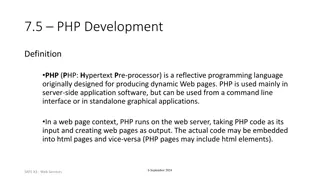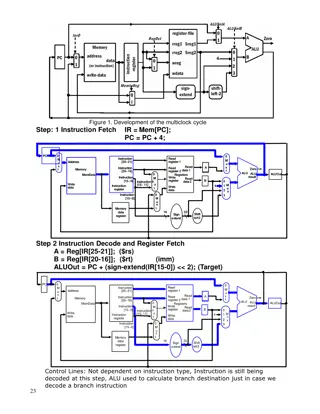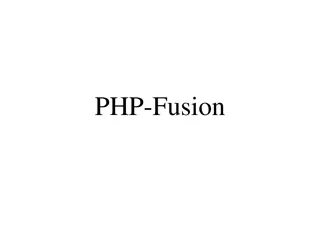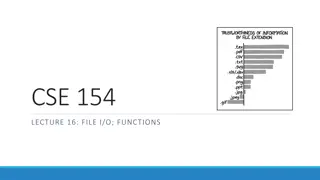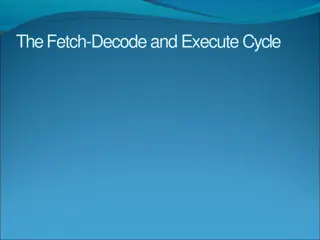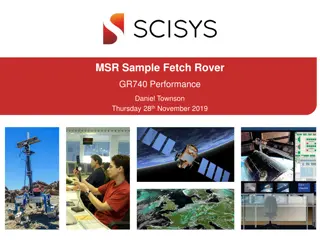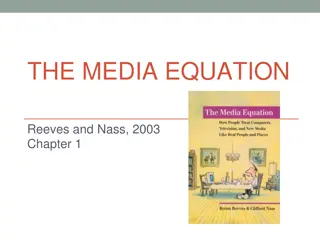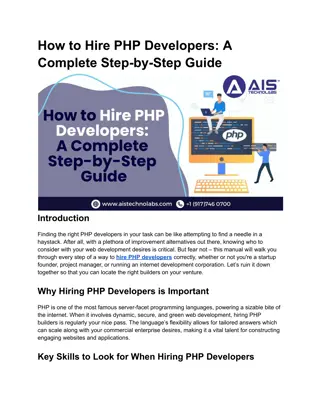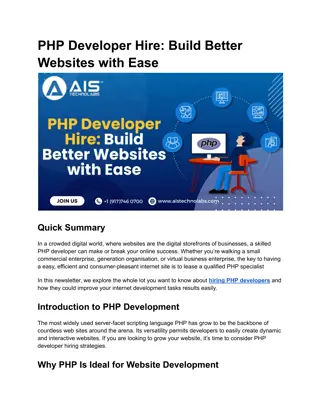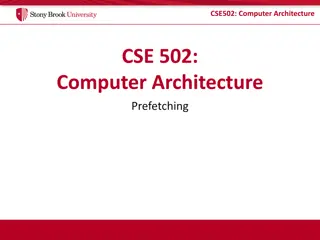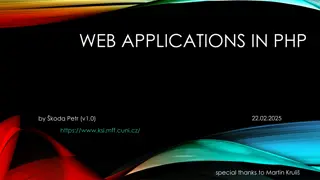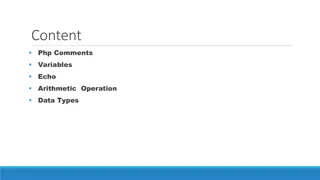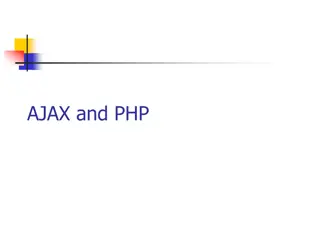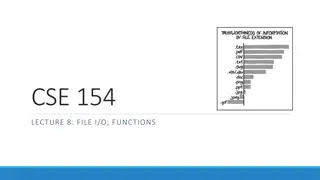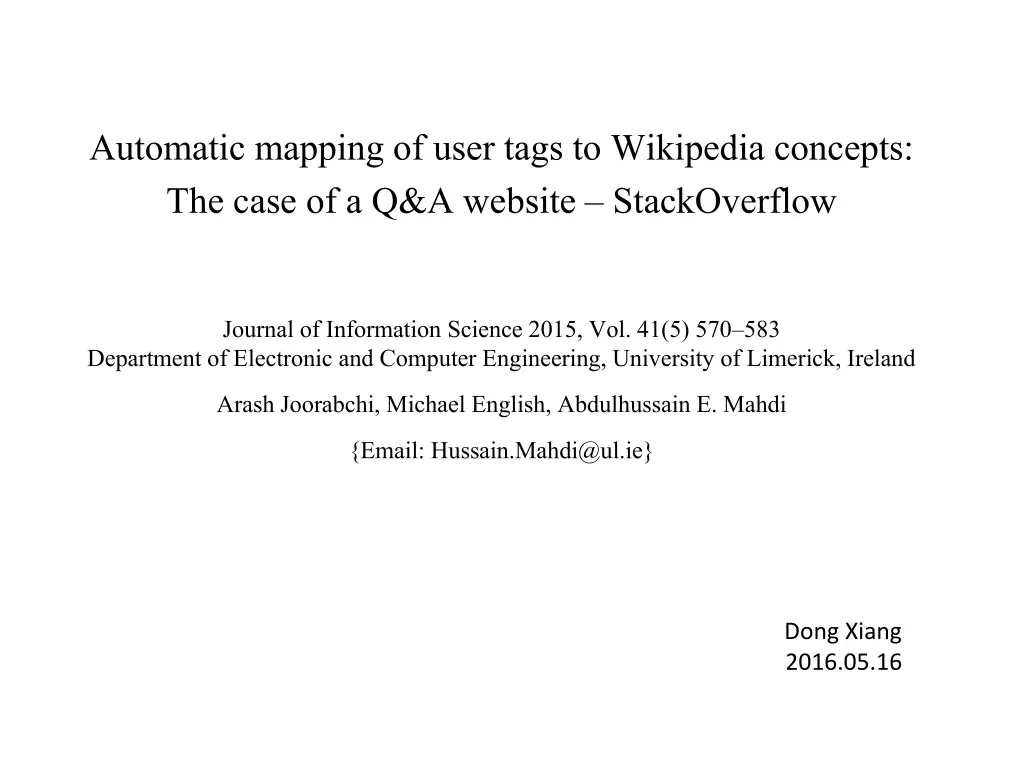
Automatic Mapping of User Tags to Wikipedia Concepts
Explore the case study of mapping user tags to Wikipedia concepts in a Q&A website like StackOverflow. User tagging, a form of crowdsourced tagging, provides cost-effective subject metadata generation. The study discusses the importance, drawbacks, and benefits of mapping user tags to Wikipedia articles for enhanced subject metadata management online.
Download Presentation

Please find below an Image/Link to download the presentation.
The content on the website is provided AS IS for your information and personal use only. It may not be sold, licensed, or shared on other websites without obtaining consent from the author. If you encounter any issues during the download, it is possible that the publisher has removed the file from their server.
You are allowed to download the files provided on this website for personal or commercial use, subject to the condition that they are used lawfully. All files are the property of their respective owners.
The content on the website is provided AS IS for your information and personal use only. It may not be sold, licensed, or shared on other websites without obtaining consent from the author.
E N D
Presentation Transcript
Automatic mapping of user tags to Wikipedia concepts: The case of a Q&A website StackOverflow Journal of Information Science 2015, Vol. 41(5) 570 583 Department of Electronic and Computer Engineering, University of Limerick, Ireland Arash Joorabchi, Michael English, Abdulhussain E. Mahdi {Email: Hussain.Mahdi@ul.ie} Dong Xiang 2016.05.16
Outline StackOverflow -> Wikipedia Methodology Experiments Summary
StackOverflow -> Wikipedia Background: the importance of tagging User tagging (a.k.a. crowdsourced tagging, social tagging, collaborative tagging) has become a popular approach to generate subject metadata for a wide range of online materials. The crowdsourced nature of user tagging reduces the cost of indexing significantly and makes it a viable option for subject metadata generation in many online settings. 3
StackOverflow -> Wikipedia Background: drawbacks of tagging As an alternative to the professional indexing with controlled vocabularies, user tagging relies on user communities to collaboratively index resources of their interest with uncontrolled vocabularies The inconsistencies caused by spelling variations, synonyms, acronyms and hyponyms 4
StackOverflow -> Wikipedia Background: the usage of Wikipedia The investigation conducted by Nature suggested that Wikipedia comes close to Encyclopaedia Britannica in terms of the accuracy of its science entries. Mapping user tags to their corresponding Wikipedia articles, as well-formed concepts, offers multifaceted benefits to the process of subject metadata generation and management in a wide range of online environments. 5
StackOverflow -> Wikipedia Problem description: 6
Outline StackOverflow -> Wikipedia Methodology Experiments Summary
Methodology (a) identification of all of the Wikipedia concepts appearing in the wiki page of the tag to be mapped (b) binary classification of detected concepts into equivalent or non- equivalent concepts
Stage (a) Wikipedia-Miner:detecting Wikipedia concepts occurring in the tags wiki pages use the topic detection functionality of the Wikipedia-Miner to identify all the Wikipedia concepts whose descriptor or non-descriptor lexical representations occur in a tag s wiki page rapidminer(StackOverflow) -> RapidMiner, Environment, Machine, Machine learning, Learning Data, Data mining, Mining
Stage (a) Features for Wikipedia concepts I. 1. Frequency - the occurrence frequency of the candidate concept and its synonyms in the tag s wiki page. 2. First Occurrence - the distance between the start of the tag s wiki page and the first occurrence of the candidate concept. 3. Last Occurrence - the distance between the end of the tag s wiki page and the last occurrence of the candidate concept. 4. Spread the distance between the first and last occurrences of the candidate concept.
Stage (a) Features for Wikipedia concepts II. 5. Max Link Probability - the ratio of the number of times it occurs in Wikipedia articles as a hyperlink. 6. Average Disambiguation Confidence - each term in the wiki page can only correspond to a single concept that has the highest probabilistic confidence. 7. Max Disambiguation Confidence - the maximum disambiguation confidence value of a candidate concept that appear in the tag s wiki page. 8. Link-based Relatedness to Other Concepts - according to the number of Wikipedia concepts that discuss/mention and have hyperlinks to both the two concepts being compared.(Wikipedia Link-based Measure) 9. Link-based Relatedness to Context - the relatedness of the candidate concept is only measured against those of other candidate concepts in the tag s wiki page that are unambiguous.
Stage (b) Building a training and testing dataset Adopt a semi-supervised labelling method to build our required dataset. This method consists of two main stages : 1> The tag s wiki page should contain one or more hyperlinks to Wikipedia articles. 2> One of those hyperlinks should be to the Wikipedia article corresponding to the first Wikipedia concept detected in the tag s wiki page.
Stage (b) Building a training and testing dataset The final dataset contains a total of 38,184 Wikipedia concept instances, out of which 1250 (3.27%) belong to the equivalent class and the remaining 36,934 (96.73%) concepts belong to the non-equivalent class.
Outline StackOverflow -> Wikipedia Methodology Experiments Summary
Experiment I. Classification algorithms comparison 15
Experiment II. Ranks of Wikipedia concept features 16
Outline StackOverflow -> Wikipedia Methodology Experiments Summary
PIDGIN Summary




